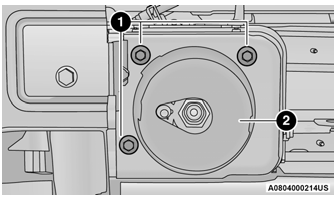Jeep Wrangler: VEHICLE MAINTENANCE / Fuel Filter Replacement — Diesel Engine
NOTE:
Using a fuel filter that does not meet the manufacturer’s filtration and water separating requirements can severely impact fuel system life and reliability. We recommend you use Mopar® Fuel Filter. Must meet 3 micron rating.
CAUTION!
- Diesel fuel will damage blacktop paving surfaces. Drain the filter into an appropriate container.
- Do not prefill the fuel filter when installing a new fuel filter. There is a possibility debris could be introduced into the fuel filter during this action. It is best to install the filter dry and allow the in-tank lift pump to prime the fuel system.
- Ensure engine is turned off.
- Remove the fuel filter protective cover to
access the fuel filter assembly.

- Retainers
- Fuel Filter Protective Cover
- Place drain pan under the fuel filter assembly.
- Open the water drain valve, and let any accumulated water and fuel drain.
- Close the water drain valve.

Fuel Filter Assembly
-
Water Drain Valve
-
-
Wipe clean the underside of the filter housing to prevent contamination from entering fuel system during service.
-
Remove the fuel filter cap and filter from the housing using a socket. Rotate counterclockwise for removal.

-
Fuel Filter Cap
-
Socket Adapter
-
-
Remove the used fuel filter cartridge from the cap and dispose of according to your local regulations.
-
Wipe clean the sealing surfaces of the cap and housing.
CAUTION!
Take care when handling the new fuel filter to prevent contamination from entering the fuel system.
- Lubricate o-ring on the cap with clean engine oil.
- Install the new fuel filter cartridge onto the cap.
- Insert the cap and filter into the housing with clockwise rotation, use a socket to tighten.
- After engine start, verify the fuel filter cap does not leak.
 Draining Fuel/Water Separator Filter — Diesel Engine
Draining Fuel/Water Separator Filter — Diesel Engine
The fuel/water separator housing is located
inside the left frame rail in front of the fuel tank.
The best access to this water drain valve is from
under the vehicle...
 Priming If The Engine Has Run Out Of Fuel — Diesel Engine
Priming If The Engine Has Run Out Of Fuel — Diesel Engine
WARNING!
Do not open the high pressure fuel system
with the engine running. Engine operation
causes high fuel pressure. High pressure fuel
spray can cause serious injury or death...
Other information:
Jeep Wrangler 2018-2026 Owners Manual: Cold Weather Precautions
Operation in ambient temperature below 32°F (0°C) may require special considerations. The following charts suggest these options: Fuel Operating Range NOTE: Use “Ultra Low Sulfur Diesel Fuels (ULSD)” ONLY. Fuel Operating Range Chart *Number 1 ULSD Fuel should only be used where extended arctic conditions 0°F (-18°C) exist...
Jeep Wrangler 2018-2026 Owners Manual: Canadian/Gate Operator Programming
For programming transmitters in Canada/ United States that require the transmitter signals to “time-out” after several seconds of transmission. Canadian radio frequency laws require transmitter signals to time-out (or quit) after several seconds of transmission – which may not be long enough for HomeLink® to pick up the signal during programming...
